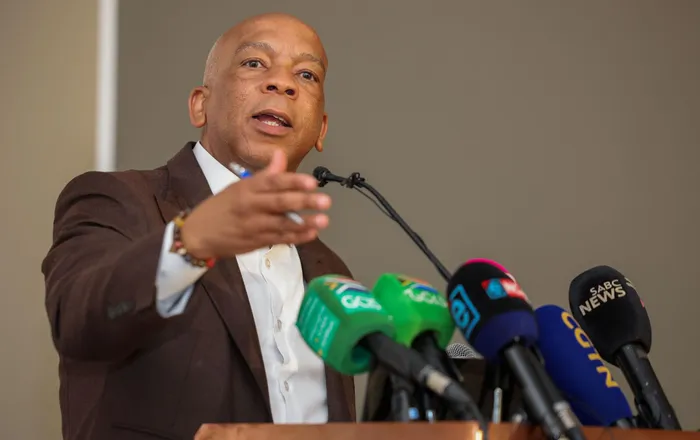
he Minister of Electricity and Energy Dr Kgosientsho Ramokgopa joined by Chief Executives from Necsa, Eskom and NRWDI provided depth on key developments in South Africa Nuclear Energy Program.
Image: GCIS
Banele Ginindza
South Africa is accelerating its nuclear energy ambitions as it positions itself to compete with China in the fast-growing African market for nuclear fuel and Small Modular Reactors (SMRs), Minister of Electricity and Energy Kgosientsho Ramokgopa said on Sunday.
More than 20 African countries are now at advanced stages of planning SMR installations, creating what the minister described as an “insatiable” continental demand for nuclear fuel.
Ramokgopa said South Africa’s nuclear development strategy is being revived and expanded, spanning the entire fuel cycle—from uranium enrichment partnerships with neighbouring countries to long-term waste disposal infrastructure.
At the core of the strategy is the planned 2 400MW nuclear new-build programme at Duynefontein, the 20-year life extension of Koeberg’s two units, and the strengthening of institutions such as the National Radioactive Waste Disposal Institute (NRWDI).
The NRWDI has now identified a site for an interim nuclear waste storage facility while it continues work toward establishing a deep geological repository, which would be only the second of its kind globally.
Ramokgopa emphasised that China is currently the world’s dominant supplier of this specialised nuclear fuel and is on track to surpass the United States in reactor capacity once several ongoing projects come online.
He said the country was reopening the research and development agenda as it has entered a new era of energy complex, adding that the government was addressing the entire fuel cycle and was looking at partnering with some neighbouring countries for the enrichment of uranium.
"We are not going to rely on the fiscus. The fiscus is constrained. We are still having significant pressures on the fiscal side. It's not our intention to temper with the fiscal envelope. But like I said, the demands and suitors to partner with us is insatiable. We are going to seek those partners," he said.
Ramokgopa said fossil fuels would continue to power energy demand but with a gradual transitioning at a pace that the country can afford to cleaner forms of energy, and nuclear will contribute to development of SMR globally.
Cabinet this week officially approved the lifting of the Pebble Bed Modular Reactor (PBMR) nuclear technology from care and maintenance since its placement in 2010, providing the South African Nuclear Energy Corporation (Necsa) with a legal basis to engage with potential international partners and investors for the revival and further development of the project.
"These conversations would not be possible if we had not lifted the care and maintenance, now South Africa is going back to its rightful place as a major player in the fuel cycle and we are confident that over a period of time, we will be a dominant indispensible player on the nuclear side," he said.
"We had placed them on ice, now we are reopening these development like laboratories and making sure that scientists get to participate in this phase. Of course driven by Necsa, we are going to make sure that we rebuild the nuclear programme and the research agenda in the country."
Ramakgopa said Necsa has been tasked with reactivating key scientific facilities, including the helium testing facility for systems and reactor readiness, as well as laboratories for beta radiation identification and measurement.
"What Necsa will do is beta identification, the players that are already playing on this field. We have lost time because over that period when we placed care and maintenance on the PBMR. It means we lost about 16 years of development and we have ambitions of catching up with those who remain in the space and ensure that the benefits are symbiotic, they are mutually reinforcable," he said.
"We have approved R2.1 billion to establish the Central Interim Storage Facility, which will be designed to also store the spent fuel. Over the long term, we want to have the Deep Geological depository. Already the NRAWDI is doing the sighting at Vaalputs. There is only one country with the deep geologocal depository. We want to follow on the footsteps of the country already leading. In the interim, we are working on the interim storage facility."
BUSINESS REPORT